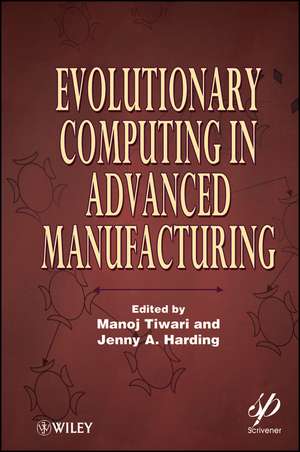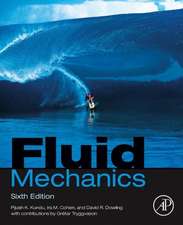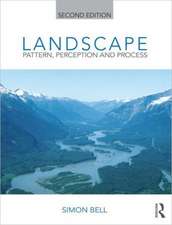Evolutionary Computing in Advanced Manufacturing: Wiley-Scrivener
Autor M Tiwarien Limba Engleză Hardback – 18 iul 2011
Din seria Wiley-Scrivener
- 9%
 Preț: 1758.26 lei
Preț: 1758.26 lei - 8%
 Preț: 659.57 lei
Preț: 659.57 lei - 8%
 Preț: 578.69 lei
Preț: 578.69 lei - 8%
 Preț: 672.97 lei
Preț: 672.97 lei - 9%
 Preț: 1625.25 lei
Preț: 1625.25 lei - 9%
 Preț: 1316.84 lei
Preț: 1316.84 lei - 9%
 Preț: 1550.79 lei
Preț: 1550.79 lei - 9%
 Preț: 1500.14 lei
Preț: 1500.14 lei - 32%
 Preț: 1096.22 lei
Preț: 1096.22 lei - 33%
 Preț: 973.38 lei
Preț: 973.38 lei - 32%
 Preț: 1374.63 lei
Preț: 1374.63 lei - 33%
 Preț: 889.43 lei
Preț: 889.43 lei - 32%
 Preț: 1134.08 lei
Preț: 1134.08 lei - 33%
 Preț: 1059.88 lei
Preț: 1059.88 lei - 33%
 Preț: 857.73 lei
Preț: 857.73 lei - 33%
 Preț: 1060.24 lei
Preț: 1060.24 lei - 32%
 Preț: 1073.39 lei
Preț: 1073.39 lei - 33%
 Preț: 689.31 lei
Preț: 689.31 lei - 32%
 Preț: 967.73 lei
Preț: 967.73 lei - 33%
 Preț: 1065.28 lei
Preț: 1065.28 lei - 31%
 Preț: 1088.72 lei
Preț: 1088.72 lei - 32%
 Preț: 990.58 lei
Preț: 990.58 lei - 32%
 Preț: 1232.69 lei
Preț: 1232.69 lei - 32%
 Preț: 1247.12 lei
Preț: 1247.12 lei - 32%
 Preț: 1059.25 lei
Preț: 1059.25 lei
Preț: 869.92 lei
Preț vechi: 915.71 lei
-5% Nou
166.45€ • 174.26$ • 137.73£
Carte în stoc
Livrare din stoc 25 februarie
Specificații
ISBN-10: 0470639245
Pagini: 354
Dimensiuni: 177 x 243 x 24 mm
Greutate: 0.64 kg
Editura: Wiley
Seria Wiley-Scrivener
Locul publicării:Hoboken, United States
Public țintă
Advanced manufacturing engineers in academia as well as industry and large and medium–sized corporation around the world. Software manufacturers and engineers will also find this book of real interest.Descriere
A timely and important volume that coherently presents and explains evolutionary computing in the context of manufacturing problems. This cutting–edge book covers emerging, evolutionary, and nature–inspired optimization techniques in the field of advanced manufacturing. The complexity of real–life advanced manufacturing problems often cannot be solved by traditional engineering or computational methods. As a result, researchers and practitioners have proposed and developed in recent years new strands of advanced, intelligent techniques and methodologies. Evolutionary computing approaches are introduced in the context of a wide range of manufacturing activities, and through the examination of practical problems and their solutions, readers will gain confidence to apply these powerful computing solutions. The initial chapters introduce and discuss the well established evolutionary algorithm, to help readers to understand the basic building blocks and steps required to successfully implement their own solutions to real–life advanced manufacturing problems. In the later chapters, modified and improved versions of evolutionary algorithms are discussed.
Evolutionary Computing in Advanced Manufacturing
- Provides readers with a solid basis for understanding the development of mathematical models for production and manufacturing–related issues
- Explicates the mathematical models and various evolutionary algorithms such as Genetic Algorithm (GA), Particle Swarm Optimization (PSO), Ant Colony Algorithm (ACO)
- Helps scholars, researchers, and practitioners in understanding both the fundamentals and advanced aspects of computational intelligence in production and manufacturing
The volume will interest manufacturing engineers in academia and industry as well as IT/Computer Science specialists involved in manufacturing. Students at MSc and PhD levels will find it very rewarding as well. All large and medium–sized corporations in manufacturing or manufacturing–related industries with complex planning?problems will find this book very useful.
Textul de pe ultima copertă
A timely and important volume that coherently presents and explains evolutionary computing in the context of manufacturing problems. This cutting–edge book covers emerging, evolutionary, and nature–inspired optimization techniques in the field of advanced manufacturing. The complexity of real–life advanced manufacturing problems often cannot be solved by traditional engineering or computational methods. As a result, researchers and practitioners have proposed and developed in recent years new strands of advanced, intelligent techniques and methodologies. Evolutionary computing approaches are introduced in the context of a wide range of manufacturing activities, and through the examination of practical problems and their solutions, readers will gain confidence to apply these powerful computing solutions. The initial chapters introduce and discuss the well established evolutionary algorithm, to help readers to understand the basic building blocks and steps required to successfully implement their own solutions to real–life advanced manufacturing problems. In the later chapters, modified and improved versions of evolutionary algorithms are discussed.
Evolutionary Computing in Advanced Manufacturing
- Provides readers with a solid basis for understanding the development of mathematical models for production and manufacturing–related issues
- Explicates the mathematical models and various evolutionary algorithms such as Genetic Algorithm (GA), Particle Swarm Optimization (PSO), Ant Colony Algorithm (ACO)
- Helps scholars, researchers, and practitioners in understanding both the fundamentals and advanced aspects of computational intelligence in production and manufacturing
The volume will interest manufacturing engineers in academia and industry as well as IT/Computer Science specialists involved in manufacturing. Students at MSc and PhD levels will find it very rewarding as well. All large and medium–sized corporations in manufacturing or manufacturing–related industries with complex planning?problems will find this book very useful.
Cuprins
Preface. 1. Production Planning using Genetic Algorithm (S. K. Kumar and M. K. Tiwari).
2. Process Planning through Ant Colony Optimization (Puneet Bhardwaj and M K. Tiwari).
3. Introducing a Hybrid Genetic Algorithm for Integration of Set Up and Process Planning (S. H. Chung and F. T. S. Chan).
4. Design for Supply Chain with Product Development Issues Using Cellular Particle Swarm Optimization (CPSO) Technique (Vikas Kumar and F. T. S. Chan).
5. Genetic Algorithms with Chromosome Differentiation (GACD) Based Approach for Process Plan Selection Problems (Nishikant Mishra and Vikas Kumar).
6. Operation Allocation in Flexible Manufacturing System Using Immune Algorithm (Mayank K. Pandey).
7. Tool Selection in FMS an Hybrid SA–TABU Algorithm Based Approach (Nitesh Khilwani, J. A. Harding and Nishikant Mishra).
8. Integrating AGVs and Production Planning with Memetic Particle Swarm Optimization (Sri Krishna, M. K. Tiwari and J. Harding).
9. Simulation–based Aircraft Assembly Planning Using a Self–Guided Ant Colony Algorithm (Sai Srinivas Nageshwaraniyer, Nurcin Celik, Young–Jun Son and Roberto Lu).
10. Applications of Evolutionary Computing to Additive Manufacturing (Candice Majewski).
11. Multiple Fault Diagnosis Using Psycho–Clonal Algorithms (Nagesh Shukla and Prakash).
12. Platform Formation Under Stochastic Demand (D. Ben–Arieh and A. M. Choubey).
13. A Hybrid Particle Swarm and Ant Colony Optimizer for Multi–attribute Partnership Selection in Virtual Enterprises (S. H. Niu, S. K. Ong and A. Y. C. Nee).
Index.
Notă biografică
Manoj Tiwari is based at the Indian Institute of Technology, Kharagpur. He is an acknowledged research leader and has worked in the areas of evolutionary computing, applications, modeling and simulation of manufacturing system, supply chain management, planning and scheduling of automated manufacturing system for about 20 years. Jenny A. Harding joined Loughborough University in 1992 after working in industry for many years. Her industrial experience includes textile production and engineering, and immediately prior to joining Loughborough University, she spent 7 years working in R&D at Rank Taylor Hobson Ltd., manufacturers of metrology instruments. Her experience is mostly in the areas of mathematics and computing for manufacturing.









